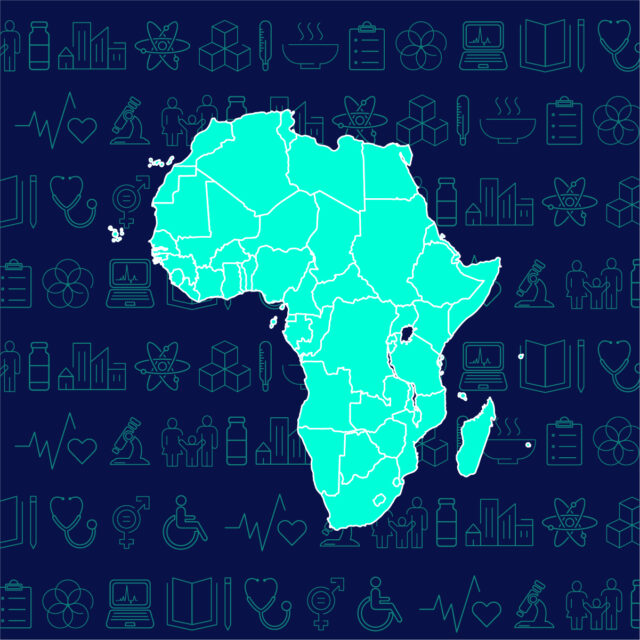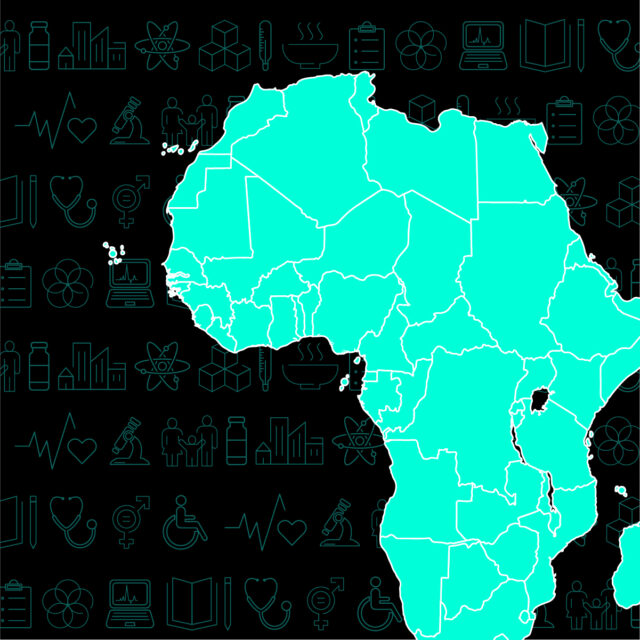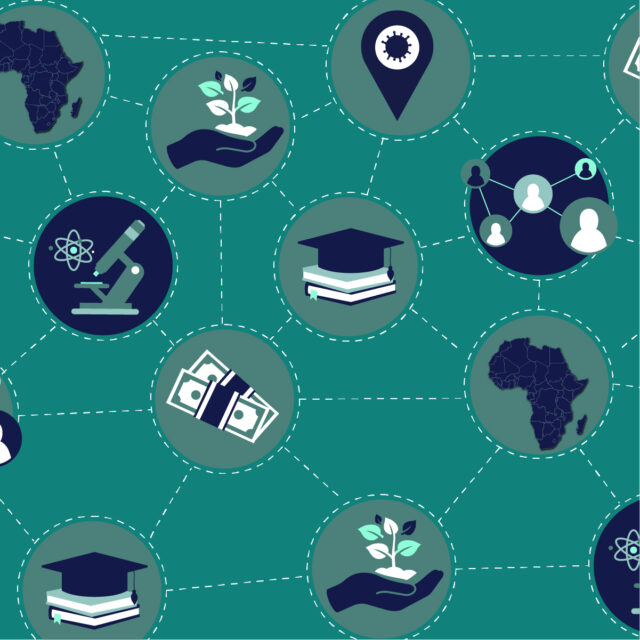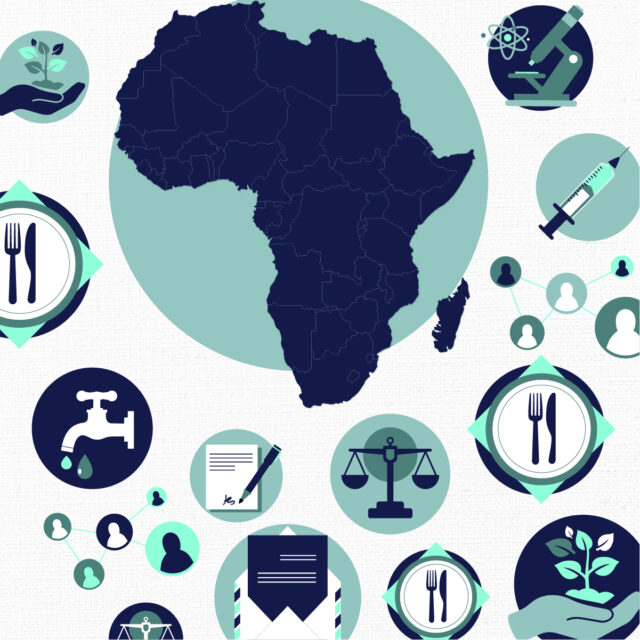Top news
Omicron rising: Health officials in South Africa announced Wednesday that the Omicron variant has become the most prevalent version of COVID-19 in the country. The number of cases doubled from Tuesday, and test positivity climbed from 10.2% to 16.5%. In Gauteng province, early analyses suggest that COVID-19 cases and test positivity are increasing faster than in previous waves. While hospitalizations in the country are also rising, it’s too soon to draw conclusions about Omicron’s transmissibility and lethality, and officials are urging caution. On Wednesday, the US reported its first Omicron case, increasing the number of countries with the new variant to 23 (and counting).
Double or nothing: The longer COVID-19 persists, the more it risks unraveling decades of hard-fought progress against HIV/AIDS, according to ONE’s latest analysis. Lockdowns and social distancing measures limited Global Fund programs in 22% of their investee countries. An estimated 37 million people didn’t get HIV tested who otherwise could have without the pandemic. And the number of people reached by HIV-prevention programs declined by 11%. Meanwhile, the economic impacts of COVID-19 — which pushed a jaw-dropping 97 million people into extreme poverty in 2020 — increase the risk of transmission for vulnerable groups. So if we want to keep making progress against HIV (which, hello, we definitely do), we need to stomp out COVID-19 ASAP. Learn more in ONE’s brief, The Increasingly Thin Red Line.
Inequality nexus: UNAIDS warned this week that 7.7 million people could die of AIDS over the next decade if leaders don’t urgently address underlying inequalities. Tackling vaccine inequity would be a great place for them to start: People with HIV are twice as likely to die of COVID-19, yet 70% of people living with the disease are in sub-Saharan Africa, where less than 5% of the population has received a first dose.
Aspen for it: In a potentially “transformative moment” for greater COVID-19 vaccine equity, South Africa’s Aspen Pharmacare may become the first African company to package and sell COVID-19 vaccines. Their deal with Johnson & Johnson, which should be finalized in early 2022, would expand upon its existing vaccine “finish and fill” production agreement — but with an added 100 million doses made monthly that Aspen will sell directly to African countries. Excited? So are we. But this good news has its limits: It does not include technology transfer, which would enable Aspen to make its own drug substance. And, it’s too soon to know J&J’s efficacy against the Omicron variant, or whether this deal would cover potential versions of the vaccine that could be made to counter variants.
Treaty yourself: WHO members agreed this week to begin talks on a pandemic treaty, which would aim to ensure a coherent, equitable, and prompt response to future pandemics. WHO Director-General Tedros Adhanom Ghebreyesus called it “a once-in-a-generation opportunity.” The treaty was once a mere twinkle in the eye of global health experts — but Omicron has created renewed urgency for a legally binding agreement. However, the US and others oppose a mechanism with legal obligations — so achieving consensus around a strong treaty among the WHO’s 194 member states will prove challenging. South Africa’s effective early-warning system, which brought Omicron to the world’s attention, exemplifies the benefits of a robust global disease radar.
Shame the blame game: There’s rightfully been blowback against the world’s knee-jerk reaction to blame South Africa for discovering and reporting the Omicron variant, and for slapping travel bans on African countries. “The people of Africa cannot be blamed for the immorally low level of vaccinations available to them. Nor should they be collectively punished for identifying and sharing crucial science and health information with the world,” reprimanded UN Secretary-General António Guterres. Ghana’s Health Minister Kwaku Agyeman-Manu was more pointed: “These measures are not based on science. They smack of racism and xenophobia.” As it turns out, they’re also counterproductive: The WHO is blaming travel bans on South Africa for delaying laboratory samples that could inform research into the new variant. Well done, everyone (slow clap).
Mandate fever: Meanwhile, South Africa is considering a vaccine mandate for certain activities. Like elsewhere in the world, there’s been pushback against a mandate: South African students fiercely rejected their university’s recent vaccine mandate, claiming scientific and ethical concerns. And the Afriforum civil society group questioned the legality of a national mandate. Ghana and Kenya will implement mandates in the coming weeks — but as South Africa has a much higher vaccination rate at 24%, it arguably has the best shot at effectively implementing one.
Something even worse? Experts at OECD are saying Omicron risks intensifying global imbalances, boosting inflation, and threatening a global recovery. Laurence Boone, the OECD’s chief economist, said the variant could delay “a return to normality or something even worse.” In turn, and with an unequal economic recovery (read: low-income countries will continue to be hit hardest), the variant could also worsen global supply chain issues. The 9 in 10 Brits who are worried that supply chains are permanently broken might be on to something.
Affronted: Three-quarters of African health workers are not fully vaccinated against COVID-19, compared to 80% in high-income countries. This injustice makes the already difficult jobs of frontline healthcare workers more dangerous, and exacerbates severe shortages of healthcare workers. In South Africa, more than 1,300 health workers died of COVID-19 in the past year, and the country was already 20 times below the recommended benchmark of healthcare workers (10.9 per 1,000 people). While all African countries prioritize healthcare workers in their vaccination plans, this is stymied by the limited availability of vaccination services, plus concerns over its safety and side effects.
Donation etiquette: COVAX shipped 11 million COVID-19 vaccine doses in 24 hours this week, setting a new record. Let’s hope the doses weren’t a surprise: The African Union and key partners, including COVAX, are urging donating countries to ensure a 10-week shelf life and 4-week delivery notice on all vaccines. This is among other provisions that are striking in their obviousness (i.e. no vaccines without syringes to administer them). The set of reasonable requests was spurred by the “ad hoc” nature of vaccine donations, which makes it very difficult for countries to adequately plan and implement vaccination campaigns.
Tough pill to swallow: Merck’s revolutionary COVID-19 pill, Molnupiravir, is only 30% effective, dramatically lower than early clinical trial results. In other not-so-good news, Regeneron announced that its widely used monoclonal antibody treatment may be less effective against the Omicron variant. The treatment has not been studied using the variant’s full sequence, however, and more data is expected by the end of the month.
Continuing virtually: This week’s 2021 Africa Investment Forum (AIF) was postponed until further notice due to growing Omicron-related health and safety concerns. This is a blow to African businesses looking for recovery capital: The event is Africa’s premier investment marketplace, and the forum had 118 deals in its pipeline, valued at over $110 billion. While stunted, investment conversations will continue without the forum.
The numbers
- 89% of the world’s COVID-19 vaccines are monopolized by G20 countries; the same group controls 71% of future deliveries.
- 179 national parliaments unanimously backed an emergency resolution to support equitable access to vaccines, particularly in low- and middle-income countries.
- 23% of Rwandans are fully vaccinated against COVID-19, well above the African continent’s average. The country began giving boosters to vulnerable groups this week in response to Omicron.
- 80% of households in eastern DRC experienced drops in remittances in early 2020, a region with a 63% prevalence of severe food insecurity.
More reads
- ONE’s policy experts shed light on The Increasingly Thin Red Line separating progress gained in the fight against HIV and reversal due to COVID-19.
- G7 leaders are failing the test: Their actions are not matching promises to end the pandemic.
- The Pfizer/BioNTech COVID-19 vaccine has saved countless lives, but is Pfizer being given too much power and profiting from “a once-in-an-epoch windfall”?
- Anthony Fauci details how Victories against AIDS have lessons for COVID-19.
- Stark inequality is good for pathogens and bad for your health, argues David Pilling
- Ben Phillips highlights the importance of fighting inequality during times of crisis in this keynote address at the Hasanah Forum 2021.
- Nancy Lee and Rakan Aboneaaj at CGD compare the scale of the multilateral development banks’ response to the COVID-19 crisis to their response to the global financial crisis.



